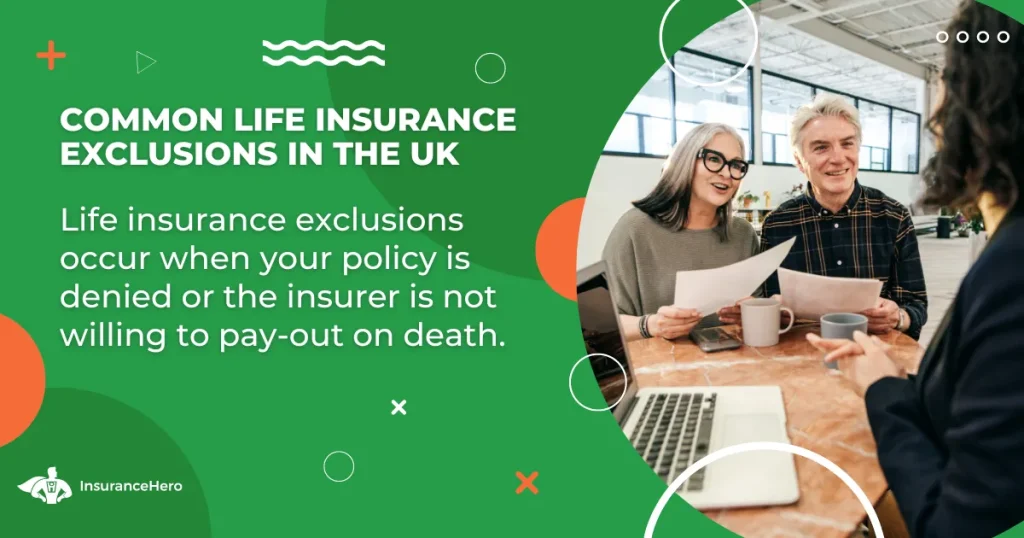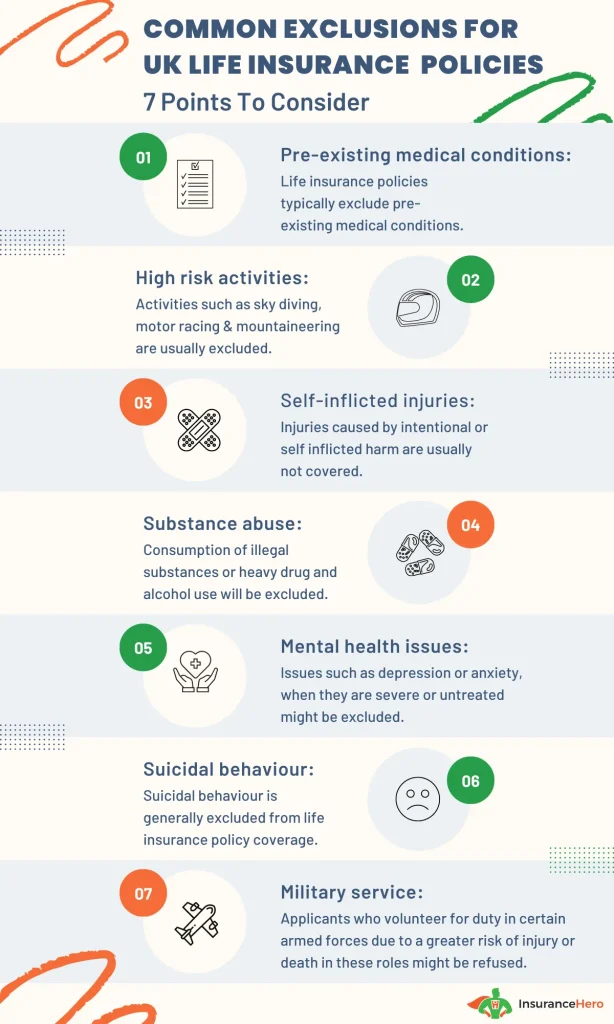Life Insurance Exclusions Guide

When you take out life insurance, a safety net immediately appears to secure your family from a financial fall.
However, in the event of your death, a policy provider may not provide the agreed coverage due to a discovered policy exclusion. Your family’s safety net has been jeopardised, and there is no one and nothing left after your passing to help them out.
Such a worrying situation can be avoided if you pay attention to details in your insurance coverage. Policy providers will want to know information about your health—whether you smoke, drink, or have a pre-existing condition—and you should use their strategy against them.
Ask the questions you think you have or do not have answers for.
In particular, go ahead and ask them what life insurance exclusions are and which may apply to your case. If you’ve already taken out life insurance, don’t worry. Now, it is Insurance Hero’s responsibility to divert you from possible avoidable risks.
Compare Quotes From The UK’s Top Providers, Completely Free Quote Service, Save Money Now

What Are the Life Insurance Policy Exclusions?
Life insurance is a financial product that provides financial protection to your loved ones in the event of your death. It is an important consideration for anyone with dependents or outstanding financial obligations, as it can help ensure that their needs are taken care of even in your absence.
However, it’s important to understand that life insurance policies come with exclusions, which are circumstances under which the policy will not provide coverage.
These exclusions can vary by policy and insurance company, but some common exclusions are found in many life insurance policies.
It’s important to carefully review the exclusions in your life insurance policy to understand what is and is not covered. This will help you make an informed decision about the level of protection that is right for you and your loved ones.

Typical Life Insurance Exclusions
Health and Lifestyle Causes
Life insurance policies can exclude coverage for certain medical conditions or treatments if they are related to health and lifestyle factors (especially if a policyholder hadn’t disclosed them before taking out the policy).
This means that if you have a medical condition that is considered to be the result of unhealthy habits or lifestyle choices, your insurance company may deny a claim after your death.
Some examples of health and lifestyle causes that may be excluded from coverage include:
- Mental health problems
- Obesity
- Unhealthy diet or nutrition
- Heart problems
It’s important to understand that every insurance policy differs, and exclusions can vary widely. It’s always a good idea to carefully review your policy terms and discuss any concerns with your insurance provider.
High-Risk Occupations
Some occupations can be more dangerous than others, which may result in some insurance providers refusing to insure you.
If they do, your monthly premiums will likely be higher than usual. Higher premiums result from insurance companies taking a risk to insure you for what may seem to them to be the short term.
These occupations may include:
- Pilots, both private and commercial
- Oil rig workers
- Construction workers
- Police officers
- Military personnel
- Deep-sea divers and scuba divers
Make sure your life insurance doesn’t exclude your family’s post-death claim if the nature of your work caused your death.
Instead, it may be better to consider specialised life insurance at Insurance Hero.
Illegal Activity/Fraud
If the policyholder provides false information on their life insurance application, the policy may be void, and coverage may be denied.
Upon your death, your policy provider takes time to investigate the cause of your death. If it is concluded that an undisclosed illness caused your death, they will have the right to refuse the payout to your family.
The same rule applies if your death happens during any illegal activity. It can be related to dealing drugs, stealing possessions, etc. Your beneficiaries will not have the right to claim the benefits.
Extreme Hobbies
Suppose the policyholder engages in dangerous activities, such as skydiving or rock climbing, and dies as a result. In that case, the policy may not provide coverage (unless it is insurance specifically chosen for these activities).
Your thirst for adrenaline shouldn’t be taken away from you just because you want your beneficiaries to claim death benefits. There are other options at Insurance Hero that will help your family get out of financial hardship should you die.
When applying for alternative insurance, you will be asked a few questions, including:
- How many years have you been practising your extreme kind of sport?
- Do you have any medical conditions?
- Do you perform high-risk activities alone or in a group?
Unlike standard life insurance, a specialised one wouldn’t have any restrictions or exclusions regarding your favourite hobby.
Substance Abuse
If the policyholder’s death is caused by alcohol or drug use, the policy may not provide coverage. Policy providers always ask about present addictions and smoking status when taking out insurance.
The fact that a policyholder smokes or excessively drinks may be considered high risk, thus resulting in higher premiums, too.
Other habits that may be harmful to your health should also be disclosed. Although your policy will be more expensive, your beneficiaries will still be able to make a claim.
Unfortunately, it doesn’t apply if the cause of your death is drug, smoking, or alcohol abuse.
Suicide
Most life insurance policies exclude suicide from coverage. This means that if the policyholder takes their own life within a certain period of time after the policy goes into effect (usually two years), the policy will not pay out.
Generic Illnesses or Pre-Existing Conditions
Some life insurance policies exclude coverage for deaths caused by pre-existing medical conditions. This means that if the policyholder had a medical condition when the policy was purchased and later died due to that condition, the policy may not pay out.
War
Life insurance policies often exclude coverage for deaths resulting from war or acts of war.
Military service employees usually pay higher premiums than office workers. Travelling to conflict zones and facing danger there makes this occupation one of the riskiest.
Therefore, one of the best ways to protect your family financially is to take out insurance for military personnel.

How to Avoid Exclusions in Insurance?
There is little chance of you avoiding all of the exclusions in your life insurance. Policy providers use them as their own personal safety net to secure themselves from clients’ fraudulent activities or facts that were not agreed upon (e.g., coverage in the event of suicide or undisclosed information).
Nevertheless, there are four things you can do to avoid policy exclusion being used against your family.
Search for a Reliable Policy Provider
Different insurance companies may have different exclusions and requirements, so it’s a good idea to shop around and compare policies from multiple companies. This will help you find a policy that meets your needs and provides the level of coverage you need.
At Insurance Hero, you can compare the leading life insurance companies with a few clicks of your mouse. Simply request a free quote and answer a few questions.
Read the Tiny Print
When taking out insurance, make sure to read and understand the terms. Mark anything that you think is important and note things that may jeopardise the claim in the future.
Carefully review a policy’s exclusions and other terms and conditions before you purchase it. Don’t be afraid to ask your insurance provider anything that worries you.
Disclose Essential Information
It’s important to be honest and transparent when applying for life insurance. If you have a pre-existing medical condition or engage in high-risk activities, be sure to disclose this information to the insurance company.
Failing to disclose relevant information could result in your policy being voided in the event of a claim.
By hiding information about your health or extreme hobbies, you risk wasting money on monthly premiums and losing coverage money for your family. Even if your monthly premium increases when you disclose such information, your family will still have financial prosperity.
Consider Specialised Coverage
If you engage in high-risk activities or have a pre-existing medical condition, it may be worth considering a specialised life insurance policy that provides coverage for those circumstances.
Keep in mind that these policies may have higher premiums and may have specific requirements you must meet. However, by disclosing your health problems or life-threatening activities that you practice, you won’t risk losing the claim.
At Insurance Hero, you can check policy providers for people practising extreme sports, risky professions (e.g., firefighters), and those with existing health conditions (e.g., cancer, diabetes, etc.).

Frequently Asked Questions
Do life insurance policy exclusions make premiums more expensive?
In general, the exclusions listed in a life insurance policy will not directly affect the premium or the price you pay for the policy. However, some of the exclusions listed in a policy, such as those related to pre-existing medical conditions or dangerous activities, may be used by the insurance company to justify charging a higher premium.
For example, if you have a pre-existing medical condition or engage in dangerous activities, you may be considered a higher risk to the insurance company, and they may charge a higher premium to cover that risk. On the other hand, if you have a clean bill of health and lead a relatively low-risk lifestyle, you may be able to get a lower premium on your life insurance policy.
It’s worth noting that life insurance premiums can also be affected by other factors, such as your age, gender, and health status, as well as the type of policy you choose and the coverage amount you need.
Is there coverage for high-risk activities?
It is possible to purchase life insurance coverage for high-risk activities, but it may be more difficult to find and may be more expensive than a policy that does not cover such activities.
Insurance companies generally classify certain activities as high risk based on the likelihood of injury or death and may be hesitant to offer coverage for them. For example, activities such as skydiving, hang gliding, and rock climbing are considered high-risk, and Insurance Hero has dedicated insurance providers for extreme sports enthusiasts.
These policies may have higher premiums and may require the policyholder to meet certain criteria, such as having a certain level of experience or training in the activity.
It’s important to carefully review the exclusions in any life insurance policy and to consider your personal needs and circumstances when deciding what coverage is right for you. If you engage in high-risk activities and are concerned about adequate protection, it may be worth considering a specialised life insurance policy.
Where are exclusions written in the policy?
Exclusions are typically listed in the “exclusions” or “limitations” section of a life insurance policy. This section outlines the circumstances under which the policy will not provide coverage.
Insurance Hero encourages policyholders always carefully review the exclusions. Exclusions can vary by policy and insurance company, so it’s a good idea to read the policy carefully and ask your insurance agent any questions you have.
In general, it’s a good idea to thoroughly understand all the terms and conditions of a life insurance policy before you purchase it. This will help you make an informed decision about the level of protection that is right for you and your loved ones.
Will life insurance payout a claim for suicide?
A death caused by a policyholder is one of the circumstances in which the beneficiaries cannot claim the payout. Although a life insurance claim is supposed to be paid out in the event of your death, there are some exclusions, suicide being one of them.
What information should you give your insurance provider?
To avoid problems in the long run and ensure financial security for your family, you should tell your insurance provider everything and more. What it means is to answer all the questions truthfully and inform about your smoking/drinking habits, hobbies, illnesses, etc. Ideally, you should disclose everything that is relevant to your life insurance.
Provided you hid or forgot to mention a generic condition or high-risk occupation, your beneficiaries may not be able to claim the payout.
Some of the things you must remember to tell about are:
- Hobbies
- Generic or pre-existing conditions
- Nature of your work
- Alcohol, smoking, and drug consumption
- Your mental health
Do you need a medical to apply for life insurance?
Depending on the cover amount, you may be required to undergo a medical checkup. This is especially true if you have stated an illness, and your insurer may want to know more about it.
In other cases, your insurer will only need to look at your medical history. Don’t worry – your medical history can only be accessed with your consent. Ask your GP to provide the necessary documents for your insurer.
Some life insurances – for example, over 50’s life insurance cover – do not require a medical.
Life Insurance Exclusions
Exclusions are a standard part of any agreement you make; therefore, it is always important to read the “fine print” before signing anything. Exclusions in life insurance include limitations on when beneficiaries cannot claim a monetary benefit.
Common types of exclusions include fraud, taking your own life, abusing substances, or dying due to dangerous activities. If your hobby or occupation is considered high-risk, you might want to take out insurance specifically for those situations. This way, you don’t risk leaving your family empty-handed and won’t worry about restrictions.
The biggest disadvantage of life insurance exclusions is that your beneficiaries may be denied a death benefit. All the premiums you have paid will go to nought, and your family will have to pay for the mortgage or debts themselves.
At the same time, insurance is a great way to ensure yourself and guarantee financial stability for your family; however, you risk losing it if you lie, inflict self-damage, or do anything that goes against your policy rules.
Steve Case is a seasoned professional in the UK financial services and insurance industry, with over twenty years of experience. At Insurance Hero, Steve is known for his ability to simplify complex insurance topics, making them accessible to a broad audience. His focus on clear, practical advice and customer service excellence has established him as a respected leader in the field.



